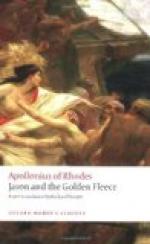And Aeson’s son in admiration thus replied: “Hypsipyle, so may all these things prove propitious by the favour of the blessed gods. But do thou hold a nobler thought of me, since by the grace of Pelias it is enough for me to dwell in my native land; may the gods only release me from my toils. But if it is not my destiny to sail afar and return to the land of Hellas, and if thou shouldst bear a male child, send him when grown up to Pelasgian Iolcus, to heal the grief of my father and mother if so be that he find them still living, in order that, far away from the king, they may be cared for by their own hearth in their home.”
He spake, and mounted the ship first of all; and so the rest of the chiefs followed, and, sitting in order, seized the oars; and Argus loosed for them the hawsers from under the sea-beaten rock. Whereupon they mightily smote the water with their long oars, and in the evening by the injunctions of Orpheus they touched at the island of Electra,[1] daughter of Atlas, in order that by gentle initiation they might learn the rites that may not be uttered, and so with greater safety sail over the chilling sea. Of these I will make no further mention; but I bid farewell to the island itself and the indwelling deities, to whom belong those mysteries, which it is not lawful for me to sing.
[Footnote 1: Samothrace.]
Thence did they row with eagerness over the depths of the black Sea, having on the one side the land of the Thracians, on the other Imbros on the south; and as the sun was just setting they reached the foreland of the Chersonesus. There a strong south wind blew for them; and raising the sails to the breeze they entered the swift stream of the maiden daughter of Athamas; and at dawn the sea to the north was left behind and at night they were coasting inside the Rhoeteian shore, with the land of Ida on their right. And leaving Dardania they directed their course to Abydus, and after it they sailed past Percote and the sandy beach of Abarnis and divine Pityeia. And in that night, as the ship sped on by sail and oar, they passed right through the Hellespont dark-gleaming with eddies.
There is a lofty island inside the Propontis, a short distance from the Phrygian mainland with its rich cornfields, sloping to the sea, where an isthmus in front of the mainland is flooded by the waves, so low does it lie. And the isthmus has double shores, and they lie beyond the river Aesepus, and the inhabitants round about call the island the Mount of Bears. And insolent and fierce men dwell there, Earthborn, a great marvel to the neighbours to behold; for each one has six mighty hands to lift up, two from his sturdy shoulders, and four below, fitting close to his terrible sides. And about the isthmus and the plain the Doliones had their dwelling, and over them Cyzicus son of Aeneus was king, whom Aenete the daughter of goodly Eusorus bare. But these men the Earthborn monsters, fearful though they were,




